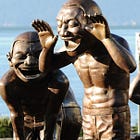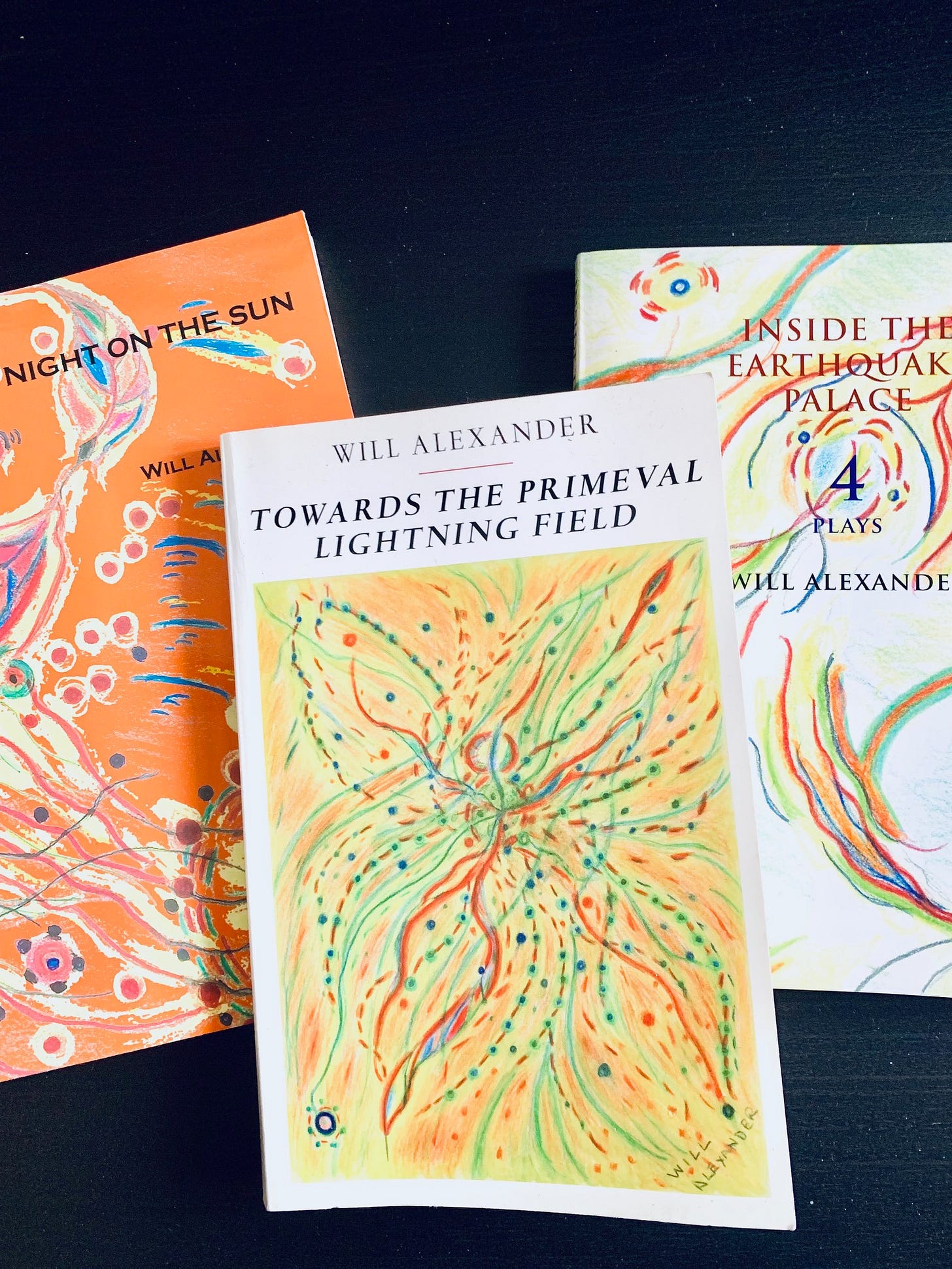In the dazzle of Will Alexander,
I renew my own toroidal willingness to turn myself inside out - organs and all - for art, for love. Devotional, yet ravenous, I drink the cosmic milk so as to coat my guts’ lining with star clusters, ready for celestial introspection.
Hyperdimensional, thus - as you’ll note from Will Alexander’s Towards the Primeval Lightning Field …
You see, as an old galactic animal I feel my presence was conjured with a syllabus of acid. Therefore I can never be tied to a form, to an inky appendage tacitly spawned with closure. Knowing this of myself I cannot equate vatics with a separate rubric of God, whose mercurial index is compounded with fissures. It is a force which I parallel with a transcendent fort of anti-septic venom. Because I am convinced that language precludes this long standing debility, it is capable of magical synergy, which baffles, which torrentially exists as occult centrality. A spark, an incantatory monoxide, which initially occurs as subtractive voltage, inscrutably summoned during the phase we've come to know as our true helical breathing. Not as an embittered delta, but as mediumistic spinning from an illusive inner fate which originally named the pre-existent Sun as its origin.
Let’s not forget Poets Theater, with this from Conduction in the Catacombs, the first play of four collected in Alexander’s Inside the Earthquake Palace:
...EURYDICE continues to circle the abstract sun of CORTAENIA. EURYDICE. Cortaenia, pretend we're wolves under a bolt of purple lightning willows. Pretend your sorcery extended through space and bled through the locality of Andromeda. Pretend you've transferred souls in their graves. Pretend you've died and changed the weather in your star group. CORTAENIA. Circulation. EURYDICE. Yes, circulation. If the Sun has failed us, why not we fail the Sun. CORTAENIA. It's try, I can't contend with the galaxy. It disturbs me, it gives me chills like wearing an eerie serpent's leather. EURYDICE. But it's happening, Cortaenia. The words are already bleeding. You're mentally drizzling scorpions. Tell me how it feels, how the blood mentally drizzles in your brain.
From the beginning, as in his first book Vertical Rainbow Climber (1987), he knew who he was, what he was doing, “en-stormed” as he was/is with generative furor - “in vertiginous ascent.”
Vertical rainbow climber, red with the heat of giants on his breath, so red he turns pale and lashes out at lightning, as if Alaska were severed by snow and brought to its knees by ominous belching, as clouds chew up their orbits, their umbilical and forsaken orbits, sending messages etched as particles of fear, sending dark lilied rainbows as storms to Nirvana, and up he goes, en-stormed, without thinking, without having consumed the umbilicus of sleep, knowing that moons change their places, that Sadhus turn liquid, and the sky twists, and terra-luna tumbles backward in vertiginous ascent, rising into the power of fractionless activityPoet, critic, and editor Jonathan Skinner shared a memory on Facebook a few weeks ago, quoting Alexander from ten years ago: Skinner describes the following as “an amalgamation of statements made across the course of an hour” on November 26th, 2013 at the Ecopoetics workshop, Warwick Writing Program, University of Warwick.
“Do not occlude your own life by footnotes - explode the footnotes! Listen to yourself exclusively: what kind of cycle, what kind of sensitivity do you have? Cultivate savor, the invisible portion that rises above language, that base sensitivity. Take a break in a different medium. Practice elliptical broadening.”
Will Alexander
The Funniest Religious Joke in the World
On the way to The Killing Joke (my book forthcoming from The Mute Canary), I discovered that the funniest joke in the world as scientifically determined by LaughLab in its 2002 final report was itself a killing joke, as you can read here:
Meanwhile, a couple of years after LaughLab’s inquiry, the Ship of Fools website created a poll on the funniest religious joke of all time. As a fan of Emo Philips since my college days, I recognized the designated winner right away.
Here’s Emo Philips himself on the matter: The best God joke ever - and it's mine!
Even now, my ears fill with his delivery of “At the Golden Gate Bridge,” although my Live From The Hasty Pudding Theatre cd (or was it a cassette?) is long since lost.
Once I saw this guy on a bridge about to jump. I said, "Don't do it!" He said, "Nobody loves me." I said, "God loves you. Do you believe in God?" He said, "Yes." I said, "Are you a Christian or a Jew?" He said, "A Christian." I said, "Me, too! Protestant or Catholic?" He said, "Protestant." I said, "Me, too! What franchise?" He said, "Baptist." I said, "Me, too! Northern Baptist or Southern Baptist?" He said, "Northern Baptist." I said, "Me, too! Northern Conservative Baptist or Northern Liberal Baptist?" He said, "Northern Conservative Baptist." I said, "Me, too! Northern Conservative Baptist Great Lakes Region, or Northern Conservative Baptist Eastern Region?" He said, "Northern Conservative Baptist Great Lakes Region." I said, "Me, too!" Northern Conservative Baptist Great Lakes Region Council of 1879, or Northern Conservative Baptist Great Lakes Region Council of 1912?" He said, "Northern Conservative Baptist Great Lakes Region Council of 1912." I said, "Die, heretic!" And I pushed him over.
I do agree Emo Philips has given us the best religious joke of all time, but for me it’s this one: I’m a great believer in the Judeo-Christian ethic. In fact, I think the whole idea of monotheism is a gift from the gods.
Not that Emo Philips was ever well-known enough to pin down a generation with his antic paraprosdokians, but I am dating myself here, and admit to being positioned solidly as Generation X. Last summer (in another FaceBook post that caught and kept drawing my attention afterwards), poet Nada Gordon shared an excerpt from an article in Harper’s September ‘23 issue: My Generation by Justin E. H. Smith; she identified its relevance to her this way in the comments - “Technically I'm the very end of boomer but GenX makes more sense in terms of my psycho-aesthetic orientation.”
It seems, now, that the historical meaning of GenX’s famous aversion to selling out cannot really be understood without considering the world that was being actively created by our parents in the years of our generation’s formative experiences. We were, it seems to me now, doing our best to preserve postwar youth culture (and even interwar youth culture, as we’ve seen) against the rising force that would, soon enough, cast us into whatever came next: the world whose most important narratives are shaped by algorithms, and in which the horror of selling out no longer has any purchase at all, since the ideal of authenticity has been switched out for the hope of virality. We tried, and we failed, to save the world from out parents - that is, to reverse or at least slow down the degeneration of the hopes that they themselves had once cherished. And because we failed, we have been written out of history.
This is pivotal, not only to my generation, pierced to the heart of our expectations as we’ve been - expectations of ourselves, of the world - how oft we’ve been disappointed by the nullity of our follow-up to what inspired us, to what kept us honest! - but to cultural possibility in general, the idea that anything can stick. Nevertheless, a perennial urgency remains at bottom of it all, however relentlessly the times have upended ideals of integrity yet embedded in time, now decisively past.
The older I get the more GenX I realize I am. I thought I was supremely atypical of my peer group, my times, my generation (I won’t go into the ego that fostered that presumption), but as all my points of reference indicate, positioned within my “psycho-aesthetic orientation” as Gordon has it, I am thoroughly GenX. When once upon a time everything popular was “commercialized bullshit” (phrase from an older brother connected to the cohort on my block), I predicated my artistic commitment on non-compromise, and retain an analog scorn for selling out, whatever that might still mean fundamentally in the digital age. Of course, there are many forms of selling out and compromise whatever the era, and truly only the soul of the artist knows if and when that weakness, cowardice, or greed has crept into practice; artistic conscience is a strict and deeply personal attendant.
In keeping with what was just said, latter-years Joe Strummer was the minstrel of this holdout. It’s the musicians more than poets and comics who define a generation’s remembrances. To that, I should probably sign off the year with a bit of music from Sinéad O’Connor or The Pogues, but you’ll get that easily elsewhere - for now, love and honor to Shane MacGowan and Sinéad.
Instead, I’ll go to where time and generations fall completely outside of the estimate. I can’t believe I never knew of Moondog until this year, who was blind, walked the streets of Manhattan in a horned Viking hat, and was a composer, inventor of instruments, and all-around musical genius. His incognito example reminds me of Ted Hawkins on Venice Beach, so I want to put the question out to everyone - can you tell me about any other buskers who really had something going, but chose to stay on the street? You can reply directly to this email or write in the comments.
Here’s Moondog at any rate. I'm This, I'm That
Similarly veined, and in contrast - if not contradiction - to last summer’s post,
Jim Croce keeps the faith: Like the fool I am and I’ll always be / I’ve got a dream, I’ve got a dream / They can change their minds but they can’t change me / I’ve got a dream…
This is my 50th entry since I began Poetry, Thought, Word Magick two years ago. Like the song says, If you’re going my way, I’ll go with you…
Versus












